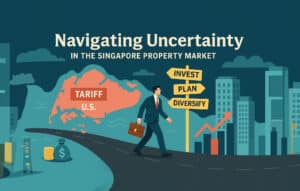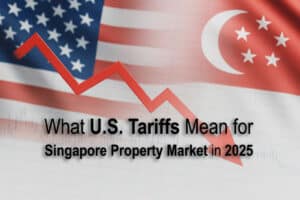The recent revision in Singapore’s Seller’s Stamp Duty (SSD) rates has drawn significant attention across the real estate sector, particularly among investors and short-term flippers. However, for most genuine homebuyers and long-term investors, the overall impact is expected to be minimal. Let’s dive into what this policy change entails, the reasons behind it, and its likely implications on the property market.
📌 What Changed in July 2025?
Effective July 3, 2025, the government raised the SSD rates by 4 percentage points across the board and extended the minimum holding period from 3 years to 4 years. Sellers now face higher tax rates—up to 16%—if they dispose of residential properties within the newly defined 4-year window.
This measure targets speculative behaviour and is a pre-emptive move to cool sub-sale activity, which has surged in recent years due to pandemic-induced construction delays and fast-rising property prices.
🔍 Why Was This Introduced?
Sharp Spike in Sub-Sale Activity
Sub-sales (resale before the property obtains its Temporary Occupation Permit or Certificate of Statutory Completion) surged to a high of 1,428 transactions in 2024 — a 69% increase from 2023. Much of this activity came from suburban condos, where buyers capitalised on price appreciation due to construction delays.
Short-Term Profit Gains
Many private residential transactions in recent years involved short holding periods. This trend of flipping properties raised concerns of speculative momentum in the market.
Rising Prices
Buyers who entered the market during 2020–2021 are now seeing healthy capital gains. The latest SSD revisions aim to prevent a rush of speculative exits as more projects reach completion from 2H2025 onward.
🏙️ Who Will Be Most Affected?
Short-Term Flippers
Speculators who intended to flip within 1–3 years now face steeper exit costs, reducing their net profit. This group will likely be deterred from entering or re-entering the market.
Buyers of Multiple Properties
Those purchasing second or subsequent homes, especially with short-term investment intent, will feel the cumulative effects of SSD, ABSD, and elevated interest rates.
Projects Hitting TOP (2025–2027)
Developments with high numbers of sub-sale-ready buyers could face slower resales around TOP dates, particularly in mass-market segments.
🛡️ Who Will Be Largely Unaffected?
Owner-Occupiers
The majority of Singaporean and PR buyers purchase homes for own-stay. Since they usually hold their property beyond 4 years, the SSD revision does not impact their plans.
Long-Term Investors
Buyers with a buy-and-hold strategy will continue to benefit from long-term growth and rental income. The SSD changes simply reinforce the importance of a longer investment horizon.
Genuine Buyers of 2025–2026 Launches
With 5,400 units set to launch in Q3 2025 and over 10,000 units expected to TOP in 2027, the market remains attractive for genuine buyers planning well beyond the 4-year mark.
📊 Market Observations
Stable Transaction Volumes
Despite the new SSD measures, transaction volumes remain healthy. This reflects a market underpinned by real demand, prudent financing, and sound fundamentals.
Minimal Disruption to Prices
The revised SSD is unlikely to affect overall pricing trends, as most buyers are not speculative. It is seen as a calibrated move that sends a clear message to opportunistic flippers while maintaining a supportive environment for genuine ownership.
Policy Calibration, Not Suppression
Rather than applying aggressive cooling measures, this SSD hike represents a strategic and measured response. It aims to pre-empt destabilising behaviour without stifling market confidence.
💡 Key Takeaways for Property Buyers & Sellers
✅ Hold for Longer-Term Gains
With the 4-year SSD window, buyers should enter the market with a longer horizon in mind to optimise returns and minimise tax implications.
✅ Focus on Exit Strategy
Those buying for investment should not just consider TOP. A clear understanding of rental yields, resale timing, and overall ROI is key.
✅ Watch for Further Policy Moves
The SSD is one tool in the government’s broader policy arsenal. Other factors like ABSD, LTV limits, and loan tenure adjustments may evolve—buyers should stay informed and agile.
📈 Final Word from PropertyNet.SG
At PropertyNet.SG, we see the SSD revision as a prudent step that reinforces Singapore’s commitment to a sustainable, owner-anchored housing market. It supports long-term resilience, filters out short-term speculation, and upholds the attractiveness of Singapore property as a stable asset class.
Planning your next move in this new policy landscape? Let our team help you assess your position and uncover real opportunities—whether you’re buying, selling, or upgrading.
🚀 Stay Ahead in the Property Market!
Be the first to receive exclusive updates, launch reviews, insider deals, and real-time alerts — directly on your preferred app.
👉 Join our community now:
🌐 Spread Knowledge. Share with Others.
Click any of the icons below to share this content with those who may benefit from it.










